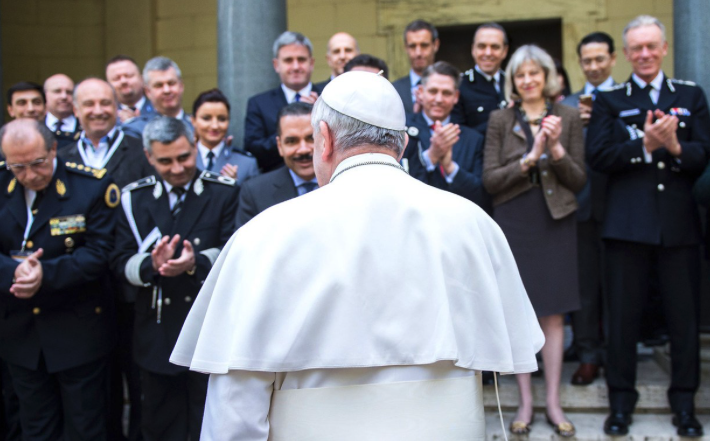Pope Francis Given ‘Thunderous Salute’ for His Anti-Slavery Commitment
The Holy Father is heralded for his work in trying to eradicate the scourge of human trafficking.

Pope Francis was given a “thunderous salute” today for his work over the past five years in combatting modern slavery and human trafficking — a priority for the Holy Father since the beginning of his pontificate.
John McCarthy, chair of the Sydney Archdiocesan Anti-Slavery Taskforce, told delegates at a Vatican conference on Monday that the Holy Father is “perhaps the greatest anti-slavery campaigner in our world today” and that tomorrow’s anniversary since his election is a “milestone for the anti-slavery movement in the contemporary world.”
McCarthy, who served as Australia’s ambassador to the Holy See from 2012 to 2016, noted Francis’ “constant flow of statements and exhortations” on this issue, that it is a “cause dear to his heart and always high in his priorities,” and praised the Pope’s “firm and consistent” belief that “we will be victorious over modern slavery and human trafficking.”
Highlighting how the Holy Father is continually calling on the world and the Church to step up and defeat the scourge, McCarthy said the Pope is offering “one of the most inspiring visions of freedom in our world” and that the Holy Father’s words “sound out like a trumpet that shall never call retreat.”
“So, on this fifth anniversary of his Pontificate, a thunderous salute to Francis comes from the peripheries; from far away Australia,” McCarthy told delegates at the conference hosted by the Pontifical Academy for Sciences on Modern Slavery, Human Trafficking and Access to Justice for the Poor and Vulnerable.
Extent of Modern Slavery
According to the latest estimates, 40.3 million people in the world today are victims of modern slavery, which the UK charity Anti-Slavery.org describes as “forced prostitution, forced labor, forced begging, forced criminality, domestic servitude, forced marriage, and forced organ removal.”
Human trafficking, it adds, is the “recruitment, harboring or transporting” of people into “a situation of exploitation through the use of violence, deception or coercion and forced to work against their will.”
Most of the victims of modern slavery (71%) are female, and one in four of them are children. Rates are highest in Africa where there are 7.6 victims for every 1000 people.
Francis has persistently called attention to the menace, telling a group of anti-modern slavery campaigners only last month that he has “never lost an occasion to denounce human trafficking as a crime against humanity.” He has also described it as “an open wound on the body of contemporary society, a scourge upon the body of Christ.” His 2015 World Day of Peace Message was dedicated to the issue.
The Holy Father, whose concerns are said to date from being deeply affected by meeting victims of sexual exploitation in Buenos Aires, made combatting it a commitment of his pontificate in the summer of 2013 when he wrote a short note on the back of an envelope to fellow Argentine Bishop Marcelo Sanchez Sorondo, chancellor of the Pontifical Academy of Sciences. “It would be good to examine human trafficking and modern slavery,” the Pope wrote, adding that “organ trafficking could be examined in connection with human trafficking."
Since then, a series of events have been held at the academy located in Casina Pio IV palazzo in the Vatican Gardens, but the Pope’s concern for the issue has led to a number of concrete initiatives. In 2014, 63 ecumenical and interreligious leaders signed a joint declaration at the Vatican committing themselves to ending the global crime. The initiative came from the Global Freedom Network, an organization which also drew inspiration from the Pope’s commitment to the issue.
In that same year, the Pope also inspired the bishops' conference of England and Wales to set up the Santa Marta Group, an alliance of international police chiefs and bishops from around the world tasked with eradicating human trafficking and modern-day slavery. The group held its 5th meeting at the Vatican last month, during which the Pope met with 110 people representing survivors and young people.
Focusing on Supply Lines
At today’s Vatican conference, John McCarthy pointed out that the Pope was “more than an inspiration” in having the issue included in the Sustainable Development Goals which calls on governments to eradicate the scourge by 2030, and end child labor by 2025.
The Church in Australia has been one of the leaders in following through on Francis’ commitment, drawing up a taskforce and a three-pronged anti-slavery strategy comprising an anti-slavery supply chain strategy, education and anti-slavery welfare services.
Last March, Archbishop Anthony Fisher of Sydney publicly committed his archdiocese to eradicating modern slavery in its supply chains, following the Vatican’s example of “slave-proofing” its own procurement practices and supply lines.
The Australian Model contains a “robust” and “superior” system of “compliance due diligence,” McCarthy said, and efforts are underway to develop an “ethical purchasing guide” to be used in parishes, families and communities. The archdiocese is also trying to get public and private sector organizations to implement similar supply chain strategies, and hopes their approach will be adopted in the Church worldwide.
But none of this would have been possible without Francis’ leadership in this area, McCarthy said. “It had always been a second level issue, never getting beyond poverty and hunger — it never crashed through that ceiling,” he told the Register March 11.
“Francis crashed it through. He took it there. It’s now a crime against humanity.”














